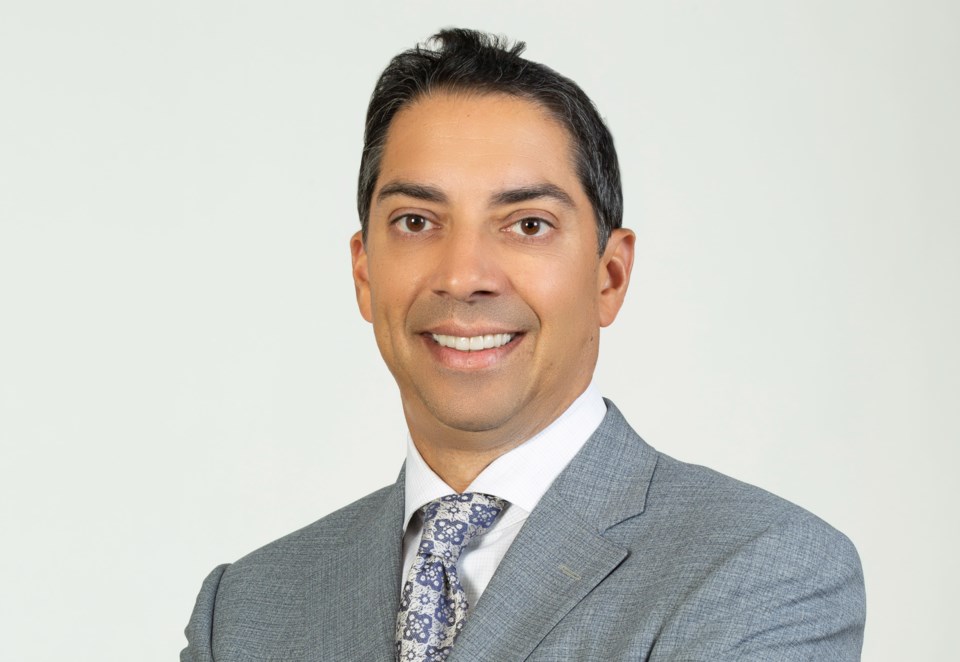Given Herb Doman’s place in B.C.’s business pantheon as a self-made lumber baron, one can be forgiven for thinking Doman Building Materials Group (TSX:DBM) is a surviving part of the same Doman family empire.
In reality, it’s not.
Amar Doman, 53, founder and CEO of Doman Building Materials and owner of the BC Lions, is indeed part of the famed Doman family. He is the nephew of Herb and Gordon Doman, and son of Ted Doman—brothers who together built Doman Industries on Vancouver Island into a billion-dollar lumber business.
But while Doman Industries ultimately collapsed, the business empire being built by a member of the family’s second generation continues to thrive and grow.
Amar Doman has prospered as an expert in business turnarounds. Through his asset management company—Futura Corporation—Doman makes strategic investments in businesses in Canada and the U.S., mainly in the building materials space.
Last year, Futura had $3.5 billion in sales and employed 4,000, Amar said in a podcast last year.
Doman Building Materials has a market cap of $700 million and is made up of seven divisions in Canada and the U.S. that own and operate 29 distribution centres, 32 pressure treatment facilities, five specialty sawmills, four specialty lumber planing mills, three truss plants and two post and pole plants, along with 117,000 acres of private timberlands, licences and tenures, and log harvesting and trucking operations in B.C.’s Interior.
The divisions include logging in Western Canada—along with road building, harvesting and trucking—Doman Lumber (the Hixson Lumber Co. in the U.S.), Lignum Forest Products (a Vancouver company specializing in specialized western red cedar wood products) and Honsador Lumber, a lumber and building materials company with several operations in Hawaii and Oregon.
Amar also owns a controlling share—34.7 per cent—of Richmond-headquartered Tree Island Steel (TSX:TSL), which has a market cap of $93 million and operates mills in B.C., California and Alberta that make wire, nails and welded wire for reinforcing concrete.
The grandson of immigrants from India, Amar was born into the lumber business on Vancouver Island, where his father and uncles had built a thriving sawmilling and timberlands operation.
Amar had already started building his own business empire at the age of 18, fresh out of high school. In a Polestar Podcast interview with Jason Boudreau of VELA Wealth, Amar said his mother, Jaswant Doman, loaned him $30,000 to buy his first lumber mill in 1988.
Plagued by debt, legal troubles, badly timed acquisitions, an insider trading scandal and, later, poor health that led founder Herb Doman to step down as CEO, Doman Industries eventually fell into ever-increasing financial distress. It was eventually broken up and, in 2004, Western Forest Products (TSX:WEF) absorbed what was left of the original Doman empire.
Meanwhile, Amar was growing his own. After buying his first lumber mill on Vancouver Island, he then bought another one in the Lower Mainland. He developed a knack for turning around companies that were struggling.
He went on to buy CanWel Building Materials from Canfor Corp. (TSX:CFP) and Weldwood in 1999. The company was renamed Doman Building Materials in 2004, after Amar took the company public.
Amar’s brother, Rob Doman, is a lawyer and Doman Building Materials’ corporate secretary, but also has his own companies. Rob is the founder and CEO of Waterstone Partners Inc. and is president and CEO of Futura Properties.
Rob’s Futura Properties is not related to Amar Doman’s Futura Corporation. Both appear to be named after their late father’s property development company, Futura Developments.
“I still remain the sole shareholder of that business [Futura Corporation], but it was kind of a nod to my father,” Doman told Boudreau.
In 2021, Doman ventured into the realm of professional sports when he bought the BC Lions football team, after the death of the team’s former owner David Braley.
Asked why he would want to buy a professional sports team, Doman told BIV that, apart from a love of football, a professional sports team is an asset that just doesn’t come along very often.
“They’re trophy assets,” he said. “They’re very hard to get.”
Business tycoons don’t typically buy sports teams to become rich—they buy sports teams because they already are rich.
“It takes millions of dollars to get there to be able to buy a team, and you’re already at that point when you have one of these assets,” Doman said. “So that’s not my first priority—it’s not profit. It’s to help the community and really get this whole province of B.C. excited about it.”
Doman lives in West Vancouver with his wife, Natalie Doman, an interior designer, and three children aged 10, 12 and 13.
This article is part of a BIV series that profiles some of B.C.’s biggest multi-generational family business empires. The first profiles: Aquilinis, Gaglardis, Bosas, Segals and Beedies.




